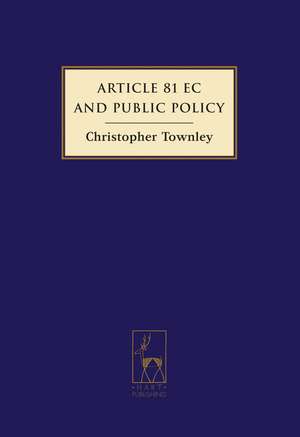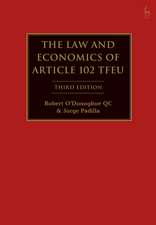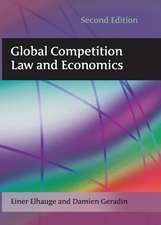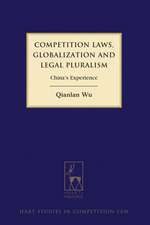Article 81 EC and Public Policy
Autor Christopher Townleyen Limba Engleză Hardback – 21 sep 2009
Preț: 838.36 lei
Preț vechi: 1201.32 lei
-30% Nou
Puncte Express: 1258
Preț estimativ în valută:
160.42€ • 168.09$ • 132.62£
160.42€ • 168.09$ • 132.62£
Carte tipărită la comandă
Livrare economică 11-25 aprilie
Preluare comenzi: 021 569.72.76
Specificații
ISBN-13: 9781841139685
ISBN-10: 1841139688
Pagini: 398
Dimensiuni: 156 x 234 x 31 mm
Greutate: 0.86 kg
Editura: Bloomsbury Publishing
Colecția Hart Publishing
Locul publicării:London, United Kingdom
ISBN-10: 1841139688
Pagini: 398
Dimensiuni: 156 x 234 x 31 mm
Greutate: 0.86 kg
Editura: Bloomsbury Publishing
Colecția Hart Publishing
Locul publicării:London, United Kingdom
Notă biografică
Christopher Townley is a Lecturer in Law at King's College London. He previously worked as a solicitor at Clifford Chance LLP and then as Principal Case Officer at The Office of Fair Trading. He has since acted as a consultant for several bodies, including The Office of Fair Trading and Ofcom.
Cuprins
IntroductionPart A: Considering Public Policy Objectives In Competition LawIntroduction To Part AChapter 1: Competition Policy and Public Policy Objectives in a Theoretical Framework1. Introduction2.Why Competition Policy Might Include Public Policy Objectives3.When Competition Policy Might Include Public Policy Objectives4. ConclusionChapter 2: Competition Policy and Public Policy Objectives in a Community Law Framework1. Introduction2. In Favour of Balancing in Article 81 EC3. Objections to Balancing in Article 81 EC4. ConclusionConclusion of Part APart B: How and Where is Public Policy Balancing Performed in Article 81 EC?Introduction to Part BChapter 3: How The Balance Is Implemented - Mere-Balancing in Article 81(1) EC1. Introduction2. Compromise Within Article 81(1) EC3. Two Related Questions4. ConclusionChapter 4: How The Balance Is Implemented - Mere-Balancing In Article 81(3) EC1. Introduction2. Compromise Within Article 81(3) EC3. The Balance4. ConclusionChapter 5: How The Balance Is Implemented - Market-Balancing In Article 81 EC1. Introduction2. Consumer (or Producer) Welfare3. Productive and Dynamic (or Allocative) Efficiencies4. Partial (or Total) Equilibrium5. ConclusionConclusion of Part BPart C: How and Where Should Public Policy Balancing Be Performed in Article 81 EC?Introduction to Part CChapter 6: How and Where Should Public Policy Balancing Be Performed in Article 81(1) EC?1. Introduction2. Prevention, Restriction or Distortion of Competition3. The Relevance of Public Policy Objectives in Article 81(1) EC4. ConclusionChapter 7: How and Where Should Public Policy Balancing Be Performed in Article 81(3) EC?1. Introduction2. The First Test: Balancing in the Public Interest3. The Second Test: Consumers' Fair Share of the Resulting Benefit4. The Third Test: Indispensability, Article 81(3)(A)5. The Fourth Test: Do Not Eliminate Competition, Article 81(3)(B)6. ConclusionChapter 8: A Framework For Balancing In Article 81 EC1. Introduction2. Defining an Over-arching Objective3.Weight for the Right Balance4. Comparing Apples and Pears - A Common Meter5. ConclusionConclusion of Part CConclusionBibliographyBooks And ChaptersArticlesSpeechesNon-Community Legislation, Guidelines, Court Judgments And ReportsCommunity Legislation, Guidelines And ReportsCommunity CasesCommunity Commission DecisionsNewspaper Articles
Recenzii
A un moment où l'économie européenne est secouée par une crise qui amène certains à remettre en discussion ses fondements mêmes, C. Townley prend le risque de nous faire replonger dans le plus classique des débats concernant le droit de la concurrence. quelles sont les valeurs qui justifient l'existence même d'un droit de la concurrence, valeurs que ce droit devrait contribuer à protéger et à mettre en oeuvre ? Il s'agit d'une question à la fois fondamentale et particulièrement actuelle, dans la mesure où c'est précisément dans les moments de crise que la robustesse d'un système antitrust est mise à l'épreuve.L'auteur traite cette question avec une rigueur méthodologique évidente dès les premières pages. L'ouvrage est soutenu par une charpente solide, d'autant plus efficace qu'elle est très clairement indiquée à chaque étape du raisonnement juridique. Celui-ci conduit le lecteur vers une conclusion, qui, si elle n'est pas inédite, est certainement loin de faire l'unanimité : la concurrence ne se résout pas à une équation économique.Le travail de C. Townley a le grand mérite de mettre en exergue les spécificités du droit européen de la concurrence qui, comme la Cour de justice l'a répété dans sa jurisprudence, a une portée très large. En effet, le régime de concurrence européen a toujours été un instrument pour la réalisation d'objectifs qui ne sont pas seulement économiques. La rigueur de l'analyse mène l'auteur à identifier très précisément les failles d'un système qui semble être moins mûr et moins développé que certains prétendent. Cette rigueur dans la recherche des aspects du système qui peuvent être améliorés permet au livre de s'appuyer sur une pars destruens très convaincante. Les conséquences de cette rigueur sur la pars construens du raisonnement aboutissent cependant à une conclusion qu'il sera très difficile de mettre concrètement en oeuvre, ce que l'auteur lui-même reconnaît d'ailleurs à plusieurs reprises. La mise en balance d'objectifs publics est par sa nature même une opération non seulement très délicate à effectuer, mais surtout très ancrée dans chaque cas d'espèce. La rédaction de lignes directrices à cet égard, bien que certainement souhaitable pour augmenter le degré de transparence du système, peut représenter une difficulté presque insurmontable pour la Commission (meme en admettant que celle-ci ait non seulement la volonté de les rédiger mais aussi intérêt à le faire).
The treatment of the subject is rich and full of interesting intuitions...This is certainly an interesting book dealing with a topic which had not yet been addressed in an English language monograph so far.One can only hope that scholars will be encouraged to respond to these stimulating and controversial ideas addressing the many questions which they raise or leave unexplored.
In general, this study constitutes a unique look at the policy and problems of Article 81, particularly some of the controversial decisions which it has produced.The author's critical remarks and references are invaluable
In light of today's new and intriguing context, the paucity of recent and systematic analyses in this area is deplorable. Christopher Townley's work is therefore most welcome and of great practical relevance.
Townley has written a much needed book.This book provides a good starting point for the further examination of the important question 'Why, how, and when might public policy have a part to play in contemporary EC competition analysis?'.
The book will serve as a rich and comprehensive source of reference with many useful discussions and direct the reader to helpful instruments to tackle a very controversial, ultimately highly political problem.The book reflects the latest comprehensive study on the relevance of the public policy and considerations in Article 81 EC.
Article 81 EC and Public Policy constitutes a timely and constructive contribution to the debate on the direction of competition policy in changing and challenging times. Christopher Townley gives a dispassionate and convincing account of the trends and themes characterising the application of Article 101 TFEU ... his commentary is extremely exhaustive and engaging and encourages stimulating reflection in the reader and, it is hoped, food for thought for policy makers at EU and national level.
The only book in the English language to date that goes into the ex-Article 81 EC policy ideas exclusively and to this detail.Townley's writing style is crisp and clear
The treatment of the subject is rich and full of interesting intuitions...This is certainly an interesting book dealing with a topic which had not yet been addressed in an English language monograph so far.One can only hope that scholars will be encouraged to respond to these stimulating and controversial ideas addressing the many questions which they raise or leave unexplored.
In general, this study constitutes a unique look at the policy and problems of Article 81, particularly some of the controversial decisions which it has produced.The author's critical remarks and references are invaluable
In light of today's new and intriguing context, the paucity of recent and systematic analyses in this area is deplorable. Christopher Townley's work is therefore most welcome and of great practical relevance.
Townley has written a much needed book.This book provides a good starting point for the further examination of the important question 'Why, how, and when might public policy have a part to play in contemporary EC competition analysis?'.
The book will serve as a rich and comprehensive source of reference with many useful discussions and direct the reader to helpful instruments to tackle a very controversial, ultimately highly political problem.The book reflects the latest comprehensive study on the relevance of the public policy and considerations in Article 81 EC.
Article 81 EC and Public Policy constitutes a timely and constructive contribution to the debate on the direction of competition policy in changing and challenging times. Christopher Townley gives a dispassionate and convincing account of the trends and themes characterising the application of Article 101 TFEU ... his commentary is extremely exhaustive and engaging and encourages stimulating reflection in the reader and, it is hoped, food for thought for policy makers at EU and national level.
The only book in the English language to date that goes into the ex-Article 81 EC policy ideas exclusively and to this detail.Townley's writing style is crisp and clear
Descriere
This book discusses the role of public policy in Article 81 of the EC Treaty and explains how complex competition law cases can be understood.




















